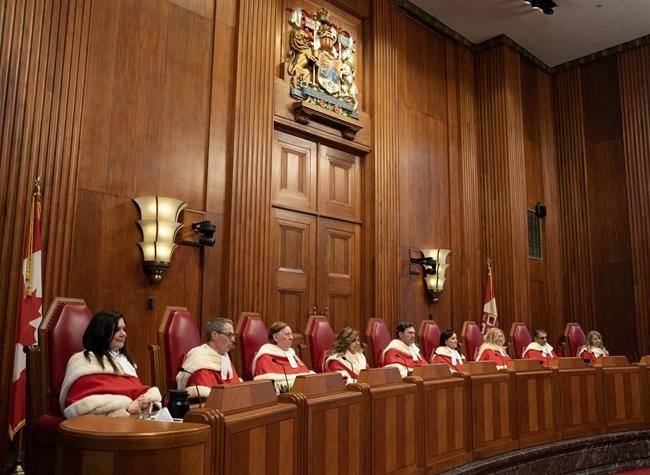
<div>The Supreme Court of Canada has affirmed the standards that appeal courts have long used to review trial judgments, saying they promote the fair assessment of testimony. Supreme Court of Canada Justice Michelle O'Bonsawin, left to right, Justice Nicholas Kasirer, Justice Malcolm Rowe, Justice Andromache Karakatsanis, Chief Justice Richard Wagner, Justice Suzanne Cote, Justice Sheilah Martin, Justice Mahmud Jamal and
Justice Mary Moreau are seen during a welcome ceremony at the Supreme Court, in Ottawa, Monday, Feb. 19, 2024. THE CANADIAN PRESS/Adrian Wyld</div>
Republished March 08, 2024 - 12:13 PM
Original Publication Date March 08, 2024 - 8:56 AM
OTTAWA - The Supreme Court of Canada has affirmed the standards that appeal courts have long used to review trial judgments, saying they promote the fair assessment of witness testimony.
In a ruling Friday in two sexual assault cases, the top court declined to recognize a novel rule that has been applied by some courts of appeal.
The new rule was sometimes used when an appeal court determined that a trial judge had relied on a common-sense assumption that was not grounded in the evidence.
The Supreme Court noted the rule has been applied in sexual assault cases that turn on competing accounts of the accused and the complainant.
Writing for the majority, Justice Sheilah Martin called the "rule against ungrounded common-sense assumptions" a significant departure from established standards of review concerning credibility and reliability assessments in criminal cases.
She said no such change to the law is warranted.
"The current standards under which appellate courts review trial judgments are well-designed, long-established and promote the fair assessment of testimony," Martin wrote.
"There is no need to fashion a new rule of law against any assumption not supported by particular evidence in the record to strive for what existing rules already accomplish."
Adopting the new rule "would undercut the functional and flexible approach" to appellate intervention and "create mischief" across the entire system, she added.
"The faulty use of common-sense assumptions in criminal trials will continue to be controlled by existing standards of review and rules of evidence."
Martin said that in some cases, a judge's use of common sense will be vulnerable to review due to a recognized error of law.
Otherwise, the standard of review will be "palpable and overriding error" — meaning, for instance, the assumption is obviously untrue and goes to the core of the case's outcome.
In the two separate, unrelated cases before the Supreme Court, the British Columbia Court of Appeal had overturned the sexual assault convictions on the basis of alleged errors of law by the trial judges.
In one case, the trial judge had concluded it was unlikely that a woman would be mistaken about the feeling of penile-vaginal penetration. The Court of Appeal found the judge had relied on speculative reasoning.
In the second case, the Court of Appeal said the trial judge had made assessments about the evidence that affected her assessment of the evidence. For example, she found a person would not ask to be spanked, out of the blue, while engaging in sexual foreplay.
"Using the rule against ungrounded common-sense assumptions, the Court of Appeal found that the trial judges erred in law by making assumptions about human behaviour not grounded in the evidence," Martin wrote.
"Having rejected this new error of law, I would assess the trial judges' findings using the proper standard of palpable and overriding error."
In turn, Martin found the trial judges made no such errors in their credibility and reliability findings.
As a result, the Supreme Court allowed both appeals by the Crown and restored the convictions.
This report by The Canadian Press was first published March 8, 2024.
News from © The Canadian Press, 2024